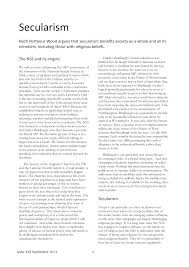The Relevance of Secularism in Today’s Society

Introduction
Secularism, the principle of separating religion from political and governmental institutions, has become increasingly important in today’s multicultural and pluralistic societies. With growing diversity in belief systems and an emphasis on individual liberties, secularism serves as a foundational concept ensuring equal treatment and consideration for individuals, regardless of their faith or lack thereof. As religious conflicts and debates around the role of faith in public life continue to rise, understanding the nuances of secularism is crucial for fostering societal harmony.
The Rise of Secularism
Throughout history, secularism has gained traction as societies began to recognize the need for impartial governance free from religious influence. Following Enlightenment thought, many Western nations adopted secular frameworks in their constitutions. This shift not only promoted freedom of belief but also led to the establishment of laws and policies that safeguard individual rights irrespective of faith. Countries like Canada, the United States, and France illustrate varying degrees of secularism, each shaping their unique interpretations and applications that resonate within their cultural contexts.
Current Events Highlighting Secularism
Recent events around the globe have spotlighted the importance of secularism in addressing conflicts arising from religious ideologies. In India, the rise of majoritarian politics has raised concerns over the eroding secular foundations of the state, prompting grassroots movements advocating for the reinvigoration of secular principles. Similarly, in Turkey, debates surrounding the secular character of the republic reflect larger tensions between traditional and modern values. In Canada, the Supreme Court’s rulings on issues such as religious symbols in public spaces demonstrate the ongoing judicial engagement with secularism’s implications on societal norms.
The Significance of Secularism for Society
Secularism plays a crucial role in maintaining social order and promoting peace in diverse societies. By ensuring that governmental institutions do not favor one religion over another, secularism protects minorities and promotes unity among people of differing beliefs. It establishes an environment where policies can be crafted based on reason and shared human rights rather than religious dogmas. In an era characterized by globalization and cultural exchange, secularism affirms the need for dialogue and coexistence, fostering communities that respect individual choices and beliefs.
Conclusion
As societies continue to grapple with religious plurality and the challenges posed by extremist ideologies, the relevance of secularism persists in providing a framework for balanced governance and social cohesion. Adopting a secular approach not only enhances democratic freedoms but also encourages a culture where diverse beliefs can thrive symbiotically. Moving forward, attention to secularism will be critical for shaping resilient societies while preserving the fundamental rights of all citizens.









